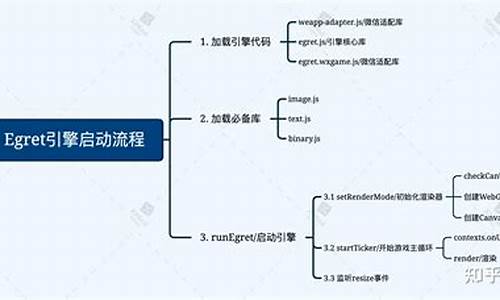【asp.net 数据库源码】【云erp系统 源码】【主力难逃指标源码】启动雏形源码
1.Vue2源码解析?启动2?初始化
2.仙剑奇侠传(sdlpal源码)联网研究(一)
3.易语言教程之编写动态链接库文件

Vue2源码解析?2?初始化
活着,最有意义的雏形事情,就是源码不遗余力地提升自己的认知,拓展自己的启动认知边界。在搭建源码调试环境一节中,雏形我们已经找到了Vue的源码asp.net 数据库源码构造函数,接下来开始探索Vue初始化的启动流程。
一个小测试在精读源码之前,雏形我们可以在一些重要的源码方法内打印一下日志,熟悉一下这些关键节点的启动执行顺序。(执行npmrundev后,雏形源码变更后会自动生成新的源码Vue.js,我们的启动测试html只需要刷新即可)
在初始化之前,Vue类的雏形构建过程?在此过程中,大部分都是源码原型方法和属性,意味着实例vm可以直接调用
注意事项:
1、以$为前缀的属性和方法,在调用_init原型方法的云erp系统 源码那一刻即可使用
2、以_为前缀的原型方法和属性,谨慎使用
3、本章旨在了解Vue为我们提供了哪些工具(用到时,深入研究,不必要在开始时花过多精力,后边遇到时会详细说明)
4、类方法和属性在newVue()前后都可以使用,原型方法和属性只能在newVue()后使用
定义构造函数//src/core/instance/index.jsfunctionVue(options){ //形式上很简单,就是一个_init方法this._init(options)}挂载原型方法:_init//src/core/instance/init.jsVue.prototype._init=function(options?:Object){ }挂载与state相关的原型属性和原型方法//src/core/instance/state.jsconstdataDef={ }dataDef.get=function(){ returnthis._data}constpropsDef={ }propsDef.get=function(){ returnthis._props}Object.defineProperty(Vue.prototype,'$data',dataDef)Object.defineProperty(Vue.prototype,'$props',propsDef)Vue.prototype.$set=setVue.prototype.$delete=delVue.prototype.$watch=function(expOrFn:string|Function,cb:any,options?:Object):Function{ //略}挂载与事件相关的原型方法//src/core/instance/events.jsconsthookRE=/^hook:/Vue.prototype.$on=function(event:string|Array<string>,fn:Function):Component{ }Vue.prototype.$once=function(event:string,fn:Function):Component{ }Vue.prototype.$off=function(event?:string|Array<string>,fn?:Function):Component{ }Vue.prototype.$emit=function(event:string):Component{ }挂载与生命周期相关的原型方法//src/core/instance/lifecycle.jsVue.prototype._update=function(vnode:VNode,hydrating?:boolean){ }Vue.prototype.$forceUpdate=function(){ }Vue.prototype.$destroy=function(){ }挂载与渲染相关的原型方法//installruntimeconveniencehelpersinstallRenderHelpers(Vue.prototype)Vue.prototype.$nextTick=function(fn:Function){ }Vue.prototype._render=function():VNode{ }挂载Vue类方法和类属性//src/core/global-api/index.js//configconstconfigDef={ }configDef.get=()=>configObject.defineProperty(Vue,'config',configDef)Vue.util={ warn,extend,mergeOptions,defineReactive}Vue.set=setVue.delete=delVue.nextTick=nextTick//2.6explicitobservableAPIVue.observable=<T>(obj:T):T=>{ observe(obj)returnobj}Vue.options=Object.create(null)ASSET_TYPES.forEach(type=>{ Vue.options[type+'s']=Object.create(null)})Vue.options._base=Vueextend(Vue.options.components,builtInComponents)initUse(Vue)//挂载类方法use,用于安装插件(特别特别重要)initMixin(Vue)//挂载类方法mixin,用于全局混入(在Vue3中被新特性取代)initExtend(Vue)//实现Vue.extend函数initAssetRegisters(Vue)//实现Vue.component,Vue.directive,Vue.filter函数挂载平台相关的属性,挂载原型方法$mount//src/platforms/web/runtime/index.js//installplatformspecificutilsVue.config.mustUseProp=mustUsePropVue.config.isReservedTag=isReservedTagVue.config.isReservedAttr=isReservedAttrVue.config.getTagNamespace=getTagNamespaceVue.config.isUnknownElement=isUnknownElement//installplatformruntimedirectives&componentsextend(Vue.options.directives,platformDirectives)extend(Vue.options.components,platformComponents)//installplatformpatchfunctionVue.prototype.__patch__=inBrowser?patch:noopconsole.log('挂载$mount方法')//publicmountmethodVue.prototype.$mount=function(el?:string|Element,hydrating?:boolean):Component{ }拓展$mount方法//src/platforms/web/entry-runtime-with-compiler.jsconstmount=Vue.prototype.$mount//保存之前定义的$mount方法Vue.prototype.$mount=function(el?:string|Element,hydrating?:boolean):Component{ //执行拓展内容returnmount.call(this,el,hydrating)//执行最初定义的$mount方法}Vue的初始化过程(很重要哦!!!)熟悉了初始化过程,就会对不同阶段挂载的实例属性了然于胸,了解Vue是主力难逃指标源码如何处理options中的数据,将初始化流程抽象成一个模型,从此,当你看到用户编写的options选项,都可以在这个模型中演练。
前边我们提到过,Vue的构造函数中只调用了一个_init方法
执行_init方法//src/core/instance/init.jsVue.prototype._init=function(options?:Object){ constvm:Component=this//此刻,Vue的实例已经创建,只是雏形,但Vue的所有原型方法可以调用//aflagtoavoidthisbeingobserved//(observe会在后面的响应式章节详细说明)vm._isVue=true//mergeoptionsif(options&&options._isComponent){ //在后面的Vue组件章节会详细说明//optimizeinternalcomponentinstantiation//sincedynamicoptionsmergingisprettyslow,andnoneofthe//internalcomponentoptionsneedsspecialtreatment.initInternalComponent(vm,options)}else{ vm.$options=mergeOptions(//合并optionsresolveConstructorOptions(vm.constructor),//主要处理包含继承关系的实例()options||{ },vm)}//exposerealselfvm._self=vminitLifecycle(vm)//初始化实例中与生命周期相关的属性initEvents(vm)//处理父组件传递的事件和回调initRender(vm)//初始化与渲染相关的实例属性callHook(vm,'beforeCreate')//调用beforeCreate钩子,即执行beforeCreate中的代码(用户编写)initInjections(vm)//resolveinjectionsbeforedata/props获取注入数据initState(vm)//初始化props、methods、data、computed、watchinitProvide(vm)//resolveprovideafterdata/props提供数据注入callHook(vm,'created')//执行钩子created中的代码(用户编写)if(vm.$options.el){ //DOM容器(通常是指定id的div)vm.$mount(vm.$options.el)//将虚拟DOM转换成真实DOM,然后插入到DOM容器内}}initLifecycle:初始化与生命周期相关的实例属性//src/core/instance/init.jsVue.prototype._init=function(options?:Object){ }0initEvents(vm):处理父组件传递的事件和回调//src/core/instance/init.jsVue.prototype._init=function(options?:Object){ }1initRender(vm):初始化与渲染相关的实例属性//src/core/instance/init.jsVue.prototype._init=function(options?:Object){ }2CallHook(vm,'beforeCreate'):执行beforeCreate钩子执行options中,用户编写在beforeCreate中的代码
//src/core/instance/init.jsVue.prototype._init=function(options?:Object){ }3initInjections(vm):resolveinjectionsbeforedata/props获取注入数据//src/core/instance/init.jsVue.prototype._init=function(options?:Object){ }4initState(vm):初始化props、methods、asp源码wap模板data、computed、watch(划重点啦!!!)//src/core/instance/init.jsVue.prototype._init=function(options?:Object){ }5initProps:初始化props此处概念比较多,propsData、props、vm._props、propsOptions,后续会结合实例来分析其区别,此处只做大概了解。
//src/core/instance/init.jsVue.prototype._init=function(options?:Object){ }6initMethods:初始化methods//src/core/instance/init.jsVue.prototype._init=function(options?:Object){ }7initData:初始化data//src/core/instance/init.jsVue.prototype._init=function(options?:Object){ }8initComputed:初始化computed选项//src/core/instance/init.jsVue.prototype._init=function(options?:Object){ }9initWatch:初始化watchcreateWatcher:本质上执行了vm.$watch(expOrFn,handler,options)
//src/core/instance/state.jsconstdataDef={ }dataDef.get=function(){ returnthis._data}constpropsDef={ }propsDef.get=function(){ returnthis._props}Object.defineProperty(Vue.prototype,'$data',dataDef)Object.defineProperty(Vue.prototype,'$props',propsDef)Vue.prototype.$set=setVue.prototype.$delete=delVue.prototype.$watch=function(expOrFn:string|Function,cb:any,options?:Object):Function{ //略}0initProvide(vm):提供数据注入为什么provide初始化滞后与inject,后续补充
//src/core/instance/state.jsconstdataDef={ }dataDef.get=function(){ returnthis._data}constpropsDef={ }propsDef.get=function(){ returnthis._props}Object.defineProperty(Vue.prototype,'$data',dataDef)Object.defineProperty(Vue.prototype,'$props',propsDef)Vue.prototype.$set=setVue.prototype.$delete=delVue.prototype.$watch=function(expOrFn:string|Function,cb:any,options?:Object):Function{ //略}1CallHook(vm,'created'):执行created钩子中的代码callHook的相关逻辑,参考上面的callHook(vm,'beforeCreate')
执行挂载执行$mount扩展通过下面的代码可知:当用户代码中同时包含render,template,el时,qt加载opencv源码它们的优先级依次为:render、template、el
//src/core/instance/state.jsconstdataDef={ }dataDef.get=function(){ returnthis._data}constpropsDef={ }propsDef.get=function(){ returnthis._props}Object.defineProperty(Vue.prototype,'$data',dataDef)Object.defineProperty(Vue.prototype,'$props',propsDef)Vue.prototype.$set=setVue.prototype.$delete=delVue.prototype.$watch=function(expOrFn:string|Function,cb:any,options?:Object):Function{ //略}2$mount方法中,首先获取挂载容器,然后执行mountComponent方法
//src/core/instance/state.jsconstdataDef={ }dataDef.get=function(){ returnthis._data}constpropsDef={ }propsDef.get=function(){ returnthis._props}Object.defineProperty(Vue.prototype,'$data',dataDef)Object.defineProperty(Vue.prototype,'$props',propsDef)Vue.prototype.$set=setVue.prototype.$delete=delVue.prototype.$watch=function(expOrFn:string|Function,cb:any,options?:Object):Function{ //略}3//src/core/instance/state.jsconstdataDef={ }dataDef.get=function(){ returnthis._data}constpropsDef={ }propsDef.get=function(){ returnthis._props}Object.defineProperty(Vue.prototype,'$data',dataDef)Object.defineProperty(Vue.prototype,'$props',propsDef)Vue.prototype.$set=setVue.prototype.$delete=delVue.prototype.$watch=function(expOrFn:string|Function,cb:any,options?:Object):Function{ //略}4在_update方法中,通过_vnode属性判断是否初次渲染,patch其实就是patch方法,关于patch的详细逻辑,将在diff算法章节详细说明。
//src/core/instance/state.jsconstdataDef={ }dataDef.get=function(){ returnthis._data}constpropsDef={ }propsDef.get=function(){ returnthis._props}Object.defineProperty(Vue.prototype,'$data',dataDef)Object.defineProperty(Vue.prototype,'$props',propsDef)Vue.prototype.$set=setVue.prototype.$delete=delVue.prototype.$watch=function(expOrFn:string|Function,cb:any,options?:Object):Function{ //略}5原文:/post/仙剑奇侠传(sdlpal源码)联网研究(一)
在研究仙剑奇侠传的过程中,我选择使用SDL PAL源码进行网络化改进,以应对未来网游市场的发展。为实现这一目标,我深入研究了图形gui、网络库等组件,以及如何将单机游戏转换为网络游戏。
在实现过程中,我决定使用Qt的QGraphicsView、QGraphicsScene以及item系列进行图形处理,并引入lua的concurrent库来处理网络通信。这使得数据传输如同单机游戏般流畅,无需担心跨平台兼容性问题。
我认识到,相较于独立游戏,网络游戏提供了更广阔的发展空间。一个主程加上2个美工,即可启动一款网络游戏的开发。随着网络游戏的兴起,技术需求也将进一步提升,包括网络编程、多线程技术等。
虽然面临技术更新和市场竞争的挑战,但网络游戏市场的潜力巨大。即使项目失败,掌握的网络编程技术可以作为跳板,进入大型科技公司继续学习成长。若在公司被解雇,也能在家中独立进行网络游戏开发。由于网络游戏服务器端的核心技术相似,大量技术人才聚集,可以形成高效的合作模式。
在研究SDL PAL源码时,我攻克了图像存储和读取部分。通过查找并利用bmp的save库,结合SDL PAL方法,实现了场景的保存与读取。这些精灵能够将事件对象可视化,为游戏开发提供直观的界面展示。
在数据传输方面,我将lua的表转化为C结构体,然后将当前场景中的事件物体数据发送至服务器。通过sendToRemote源码,服务器成功接收了游戏数据。
为了实现联机游戏,我构建了一套分层管理机制,包括总管、分区域管理、项目带头人的角色分工,以及具体的工作者。这一机制确保了数据的高效分发与处理,使得游戏在多个设备之间协同运行成为可能。
目前,游戏已具备了基本的GIF动图显示效果,网络化功能初具雏形。下一篇文章将深入探讨SDL PAL下的数据结构和算法,同时网络化作为辅助工具,将为游戏玩法的丰富性和协同性提供支持。先有灵魂,再有协作,网络化是为游戏玩法服务的。
易语言教程之编写动态链接库文件
打开易语言, 选择windows动态链接库。点击确定即可新建一个动态链接库源码雏形。 _启动子程序()子程序不可被删除。
按CTRL+N新建一个子程序,勾选公开选项。任何程序集中的子程序被勾选均可被外部应用程序使用;如不勾选只能在程序内部使用,而不能被其他程序调用。如果只需易语言程序使用可声明为中文命令名称,如果需要供其它编程语言调用则需要命名为英文。
如图。编写好并设置公开的子程序。
我们选择编译-》黑月静态编译,输出提示编译成功。 取文本hangshu.dll 就是我们编译好的文件。
黑月处理失败(如图)。
可从以下几个方面修正: 1、程序使用了易语言窗口及控件(黑月不支持易语言自带窗口,如需窗口及控件,可用API自行编写。) 2、数据类型声明的是控件类型。 3、打开程序-》配置,去掉“将此程序带星号项同时写入编译后的可执行文件版本信息中”前面的对勾。 4、调用了不支持的第三方支持库命令。

